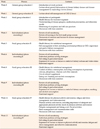1. Fishbane S, Hazzan AD, Halinski C, Mathew AT. Challenges and opportunities in late-stage chronic kidney disease. Clin Kidney J. 2015; 8(1):54–60. DOI:
10.1093/ckj/sfu128.

2. Clarke AL, Yates T, Smith AC, Chilcot J. Patient's perceptions of chronic kidney disease and their association with psychosocial and clinical outcomes: a narrative review. Clin Kidney J. 2016; 9(3):494–502. DOI:
10.1093/ckj/sfw014.

3. Smart NA, Dieberg G, Ladhani M, Titus T. Early referral to specialist nephrology services for preventing the progression to end-stage kidney disease. Cochrane Database Syst Rev. 2014; (6):CD007333. DOI:
10.1002/14651858.CD007333.pub2.

4. Bodenheimer T, Wagner EH, Grumbach K. Improving primary care for patients with chronic illness: the chronic care model, part 2. JAMA. 2002; 288(15):1909–1914.
5. Bae J, Park H, Kim S, Bang J. Factors influencing depression in patients with chronic renal failure. J Korean Acad Psychiatr Ment Health Nurs. 2011; 20(3):261–270. DOI:
10.12934/jkpmhn.2011.20.3.261.

6. Yamagata K, Makino H, Iseki K, Ito S, Kimura K, Kusano E, et al. Effect of behavior modification on outcome in early- to moderate-stage chronic kidney disease: a cluster-randomized trial. PLoS One. 2016; 11(3):e0151422. DOI:
10.1371/journal.pone.0151422.

7. Bonner A, Havas K, Douglas C, Thepha T, Bennett P, Clark R. Self-management programs in stages 1-4 chronic kidney disease: a literature review. J Ren Care. 2014; 40(3):194–204. DOI:
10.1111/jorc.12058.
8. Russell CL, Cronk NJ, Herron M, Knowles N, Matteson ML, Peace L, et al. Motivational interviewing in dialysis adherence study (MIDAS). Nephrol Nurs J. 2011; 38(3):229–236.
9. Moattari M, Ebrahimi M, Sharifi N, Rouzbeh J. The effect of empowerment on the self-efficacy, quality of life and clinical and laboratory indicators of patients treated with hemodialysis: a randomized controlled trial. Health Qual Life Outcomes. 2012; 10:115. DOI:
10.1186/1477-7525-10-115.

10. Tasy SL, Hung LO. Empowerment of patients with end-stage renal disease-a randomized controlled trial. Int J Nurs Stud. 2004; 41(1):59–65. DOI:
10.1016/S0020-7489(03)00095-6.
11. Curtin RB, Walters BAJ, Schatell D, Pennell P, Wise M, Klicko K. Self-efficacy and self-management behaviors in patients with chronic kidney disease. Adv Chronic Kidney Dis. 2008; 15(2):191–205. DOI:
10.1053/j.ackd.2008.01.006.

12. Thomas-Hawkins C, Zazworsky D. Self-management of chronic kidney disease. Am J Nurs. 2005; 105(10):40–48.

13. Panagioti M, Richardson G, Small N, Murray E, Rogers A, Kennedy A, et al. Self-management support interventions to reduce health care utilization without compromising outcomes: a systematic review and meta-analysis. BMC Health Serv Res. 2014; 14:356. DOI:
10.1186/1472-6963-14-356.

14. Levey AS, Coresh J, Balk E, Kausz AT, Levin A, Steffes MW, et al. National Kidney Foundation practice guidelines for chronic kidney disease: evaluation, classification, and stratification. Ann Intern Med. 2003; 139(2):137–147. DOI:
10.7326/0003-4819-139-2-200307150-00013.

15. Lee SJ, Kim S. Development of self-management instrument for pre-dialysis patients with chronic kidney disease. J Korea Contents Assoc. 2014; 14(7):367–375. DOI:
10.5392/jkca.2014.14.07.367.

16. Ware JE, Kosinski M. Interpreting SF-36 summary health measures: a response. Qual Life Res. 2001; 10(5):405–413.
17. Clark NM, Gong M, Kaciroti N. A model of self-regulation for control of chronic disease. Health Educ Behav. 2001; 28(6):769–782.

18. Zimmerman MA. Psychological empowerment: issues and illustrations. Am J Community Psychol. 1995; 23(5):581–599.

19. Tuot DS, Plantinga LC, Hsu C, Jordan R, Burrows NR, Hedgeman E, et al. Chronic kidney disease awareness among individuals with clinical markers of kidney dysfunction. Clin J Am Soc Nephrol. 2011; 6(8):1838–1838. DOI:
10.2215/CJN.00730111.

21. Lilly CL, Bryant LL, Leary JM, Vu MB, Hill-Briggs F, Samuel-Hodge CD, et al. Evaluation of the effectiveness of a problemsolving intervention addressing barriers to cardiovascular disease prevention behaviors in 3 underserved populations: Colorado, North Carolina, West Virginia, 2009. Prev Chronic Dis. 2014; 11:E32. DOI:
10.5888/pcd11.130249.

22. Thom DH, Ghorob A, Hessler D, De Vore D, Chen E, Bodenheimer TA. Impact of peer health coaching on glycemic control in low-income patients with diabetes: a randomized controlled trial. Ann Fam Med. 2013; 11:137–144. DOI:
10.1370/afm.1443.

23. Kramer H. Dietary patterns, calories, and kidney disease. Adv Chronic Kidney Dis. 2013; 20(2):135–140. DOI:
10.1053/j.ackd.2012.12.004.

24. Korpershoek YJG, Bos-Touwen ID, de Man-van, Lammers J-WJ, Schuurmans MJ, Trappenburg JCA. Determinants of activation for self-management in patients with COPD. Int J Chron Obstruct Pulmon Dis. 2016; 11(1):1757–1766. DOI:
10.2147/COPD.S109016.

25. Mastaneh Z, Mouseli L. Patients' awareness of their rights: insight from a developing country. Int J Health Policy Manag. 2013; 1(2):143–146. DOI:
10.15171/ijhpm.2013.26.

26. Mason J, Stone M, Khunti K, Farooqi A, Carr S. Educational needs for blood pressure control in chronic kidney disease. J Ren Care. 2007; 33(3):134–138. DOI:
10.1111/j.1755-6686.2007.tb00059.x.

27. Lin MY, Liu MF, Hsu LF, Tsai PS. Effects of self-management on chronic kidney disease: a meta-analysis. Int J Nurs Stud. 2017; 74:128–137. DOI:
10.1016/j.ijnurstu.2017.06.008.

28. Lee MC, Wu SV, Hsieh NC, Tsai JM. Self-Management programs on eGFR, depression, and quality of life among patients with chronic kidney disease: a meta-analysis. Asian Nurs Res. 2016; 10(4):255–262. DOI:
10.1016/j.anr.2016.04.002.

29. Audulv A. The over time development of chronic illness selfmanagement patterns: a longitudinal qualitative study. BMC Public Health. 2013; 13(452):1–15. DOI:
10.1186/1471-2458-13-452.

30. Nygårdh A, Malm D, Wikby K, Ahlström G. The complexity in the implementation process of empowerment-based chronic kidney care: a case study. BMC Nurs. 2014; 30(22):13–22. DOI:
10.1186/1472-6955-13-22.






 PDF
PDF ePub
ePub Citation
Citation Print
Print







 XML Download
XML Download